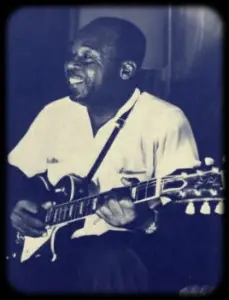HENRY TOWNSEND
 St. Louis was a big Blues town in the 20s and 30s, and Mississippi born Henry was at the epicentre of the scene there. A fine singer, he recorded with his open-tuned slide guitar for Columbia in 1929 and Paramount in 1931. He taught himself to play piano and became one of the city’s most versatile performers. Henry was a stalwart of the club scene in St. Louis for many decades, where his stubborn personality gained him the nick-name ‘Mule’. His services were in high demand as a session man, most notably backing pianist Walter Davis on at least 100 tracks. Henry cut some more of his own songs for the Bluebird label in 1937, bringing his own total recorded output to a meagre 13 tracks, until his ‘re-discovery’ in the 60s. His influence on the Blues was much stronger than this short catalogue would imply; in his day he was just as well regarded as his contemporaries Roosevelt Sykes and Peetie Wheatstraw. Henry continued to play the clubs and occasional Festivals and he was touring until the end of the century. His 1976 album ‘Mule’ was a reference to his nick-name and Henry continued to issue the occasional record every few years. In 2008 he was awarded a posthumous Grammy for his collaboration with Pinetop Perkins, ‘Honeyboy’ Edwards and Robert Jr. Lockwood on their album, Last of The Mississippi Delta Bluesmen.
St. Louis was a big Blues town in the 20s and 30s, and Mississippi born Henry was at the epicentre of the scene there. A fine singer, he recorded with his open-tuned slide guitar for Columbia in 1929 and Paramount in 1931. He taught himself to play piano and became one of the city’s most versatile performers. Henry was a stalwart of the club scene in St. Louis for many decades, where his stubborn personality gained him the nick-name ‘Mule’. His services were in high demand as a session man, most notably backing pianist Walter Davis on at least 100 tracks. Henry cut some more of his own songs for the Bluebird label in 1937, bringing his own total recorded output to a meagre 13 tracks, until his ‘re-discovery’ in the 60s. His influence on the Blues was much stronger than this short catalogue would imply; in his day he was just as well regarded as his contemporaries Roosevelt Sykes and Peetie Wheatstraw. Henry continued to play the clubs and occasional Festivals and he was touring until the end of the century. His 1976 album ‘Mule’ was a reference to his nick-name and Henry continued to issue the occasional record every few years. In 2008 he was awarded a posthumous Grammy for his collaboration with Pinetop Perkins, ‘Honeyboy’ Edwards and Robert Jr. Lockwood on their album, Last of The Mississippi Delta Bluesmen.
A short documentary about Henry;